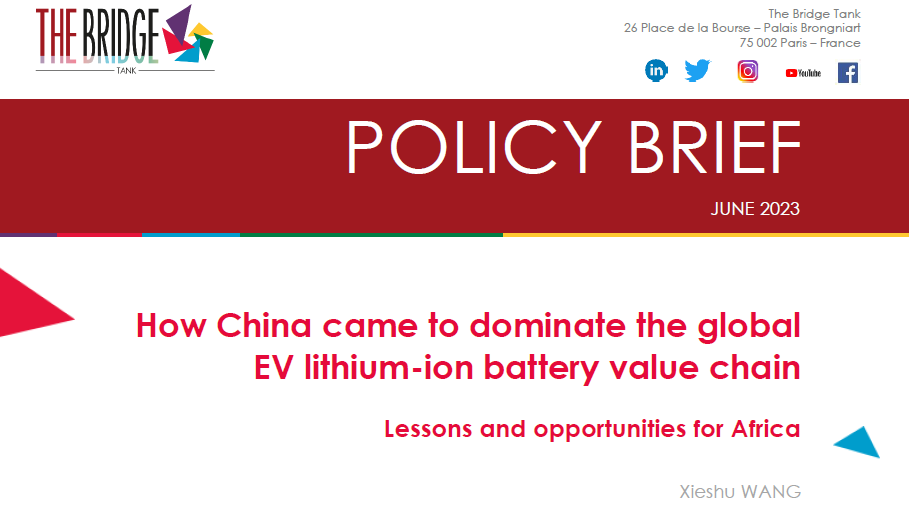This policy brief was written by Xieshu WANG, Senior Expert, Finance, Resources and Mobility, The Bridge Tank, and was first published by the Centre for Business and Development Studies, Copenhagen Business School Policy Brief No. December 2022. For the original publication, click here.
The electrification of vehicles is accelerating and the global automotive industry is under full transformation. China has become an indispensable partner for EV makers as the only country that has succeeded in building a complete and competitive industry value chain of EV lithium-ion batteries. Top-down government-led policymaking has been an important driver; bottom-up firm-level vertical integration strategy and investments have effectively created a closed-loop supply chain. Africa is still at an early stage in this mobility transition. But with its rich deposits of minerals and potential markets, it can become a key player in the global EV value chain, if a favourable ecosystem for the fast uptake of EV and related green businesses could be developed in time.
Key points:
- Government-led policymaking, constant adjustments, and temporary infant industry protection policies have been some of the main drivers of the fast-growing EV industry and the lithium-ion battery sector in China.
- Many Chinese firms deploy a strategy that can be defined as “specialised vertical integration”, i.e., actively entering related upstream and/or downstream segments within the EV lithium-ion battery supply chain, while continuing to reinforce their existing capacity in the original segment of the value chain, which serves as an expansion base.
- With the soaring demand for minerals for batteries and EVs, Africa, with its rich deposits of lithium, copper, cobalt and other minerals, could become a key player in the global EV value chain.
- Designing an EV promoting regulatory framework, applying incentive policies, & developing government-led R&D programs are important starting points to attract technologically leading MNEs in the EV value chain, encourage local startups and develop competitive industrial clusters. Fostering regional alliances and collaboration as well as developing industrial investment funds dedicated to firms along the EV value chain are other avenues of action that ought to be explored.
About the author
Xieshu WANG is Senior Expert, Finance, Resources and Mobility at The Bridge Tank and associated researcher at the Centre de recherche en Économie de l’Université Paris Nord (CEPN). She is a member of the Osservatorio sulle Economie Emergenti Torino (OEET) and has been a research fellow at the Interdisciplinary Institute for Innovation of Ecole Polytechnique de Paris and the Department of Economics and Statistics ‘Cognetti de Martiis’ of the University of Turin.

